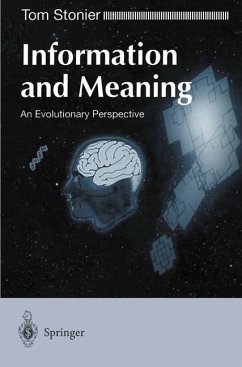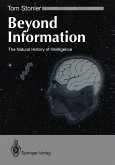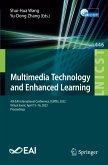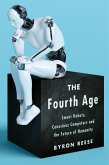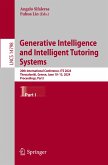- Broschiertes Buch
- Merkliste
- Auf die Merkliste
- Bewerten Bewerten
- Teilen
- Produkt teilen
- Produkterinnerung
- Produkterinnerung
Information and Meaning is the third book in a trilogy exploring the nature of information, intelligence and meaning. It begins by providing an overview of the first two works of the trilogy, then goes on to consider the meaning of meaning. This explorat ion leads to a theory of how the brain works. This book differs from others in the field, in that it is written from the perspective of a theoretical biologist looking at the evolution of information systems as a basis for studying the phenomena of information, intelligence and meaning. It describes how neurons create a brain which understands…mehr
Andere Kunden interessierten sich auch für
![Beyond Information Beyond Information]() Tom StonierBeyond Information63,99 €
Tom StonierBeyond Information63,99 €![Einführung in die allgemeine Informationstheorie Einführung in die allgemeine Informationstheorie]() Johannes PetersEinführung in die allgemeine Informationstheorie54,99 €
Johannes PetersEinführung in die allgemeine Informationstheorie54,99 €![Multimedia Technology and Enhanced Learning Multimedia Technology and Enhanced Learning]() Multimedia Technology and Enhanced Learning75,99 €
Multimedia Technology and Enhanced Learning75,99 €![Enterprise Information Systems VI Enterprise Information Systems VI]() Enterprise Information Systems VI149,99 €
Enterprise Information Systems VI149,99 €![Alan Turing: The Enigma Alan Turing: The Enigma]() Andrew HodgesAlan Turing: The Enigma9,99 €
Andrew HodgesAlan Turing: The Enigma9,99 €![Fourth Age: Smart Robots, Conscious Computers, and the Future of Humanity Fourth Age: Smart Robots, Conscious Computers, and the Future of Humanity]() Byron ReeseFourth Age: Smart Robots, Conscious Computers, and the Future of Humanity12,99 €
Byron ReeseFourth Age: Smart Robots, Conscious Computers, and the Future of Humanity12,99 €![Generative Intelligence and Intelligent Tutoring Systems Generative Intelligence and Intelligent Tutoring Systems]() Generative Intelligence and Intelligent Tutoring Systems55,99 €
Generative Intelligence and Intelligent Tutoring Systems55,99 €-
-
-
Information and Meaning is the third book in a trilogy exploring the nature of information, intelligence and meaning. It begins by providing an overview of the first two works of the trilogy, then goes on to consider the meaning of meaning. This explorat ion leads to a theory of how the brain works. This book differs from others in the field, in that it is written from the perspective of a theoretical biologist looking at the evolution of information systems as a basis for studying the phenomena of information, intelligence and meaning. It describes how neurons create a brain which understands information inputs and then is able to operate on such information.
Hinweis: Dieser Artikel kann nur an eine deutsche Lieferadresse ausgeliefert werden.
Hinweis: Dieser Artikel kann nur an eine deutsche Lieferadresse ausgeliefert werden.
Produktdetails
- Produktdetails
- Verlag: Springer / Springer London / Springer, Berlin
- Artikelnr. des Verlages: 978-3-540-76139-6
- 1997.
- Seitenzahl: 272
- Erscheinungstermin: 15. August 1997
- Englisch
- Abmessung: 235mm x 155mm x 15mm
- Gewicht: 410g
- ISBN-13: 9783540761396
- ISBN-10: 354076139X
- Artikelnr.: 26636681
- Herstellerkennzeichnung Die Herstellerinformationen sind derzeit nicht verfügbar.
- Verlag: Springer / Springer London / Springer, Berlin
- Artikelnr. des Verlages: 978-3-540-76139-6
- 1997.
- Seitenzahl: 272
- Erscheinungstermin: 15. August 1997
- Englisch
- Abmessung: 235mm x 155mm x 15mm
- Gewicht: 410g
- ISBN-13: 9783540761396
- ISBN-10: 354076139X
- Artikelnr.: 26636681
- Herstellerkennzeichnung Die Herstellerinformationen sind derzeit nicht verfügbar.
1 Introduction.- Philosophical Preface.- The Need for a General Theory of Information.- Knowledge Engineering.- Some Definitions and Problems.- Until Recently, Why Has Information Been Ignored?.- 2 The Nature of Information.- What is Information?.- Information and the Laws of Physics.- Shannon's Theory of Communications.- Information and Entropy.- The Interconversion of Information and Energy.- Information as a Fundamental Property of the Universe.- Infons.- Devlin's 'Infons'.- The Evolution of the Universe.- The Evolution of Biosystems.- Conclusion.- 3 The Diversity of Information Processing.- Information Transductions.- The Human Social Information-Processing System.- Ants: a Model for Social Information-Processing Systems.- The Neurological Information Processing System.- The Immune System.- Maintaining Body Fluid Balance.- Other Bodily Subsystems.- Cellular Information-Processing Systems.- Mechanical Information-Processing Systems.- Physical Information-Processing Systems.- Electronic Information-Processing Systems.- General Discussion.- Conclusion.- 4 The Spectrum of Intelligence.- Intelligence: the Basic Concept.- Intelligence: a Spectrum of Phenomena.- Beyond Information: the Evolution of Intelligence.- Human Intelligence.- Sub-Human Intelligence.- Sub-Human Self-Consciousness.- Instinctive Behaviour.- Are Brains Necessary for Intelligent Behaviour?.- Is a Nervous System Necessary for Intelligent Behaviour?.- The Collective Intelligence of Microorganisms.- DNA as Memory.- Summary and Concluding Remarks.- 5 Proto-Intelligence.- Proto-Intelligence.- Some Further Thoughts About the Preconditions for Intelligence.- 6 The Origins of Bio-Intelligence.- Teilhard de Chardin's Concept of the 'Corpuscle'.- Forming a Bio-Corpuscle.- Is the Vesicular TheoryEnough?.- Clay Minerals and the Origin of Life.- Is the Clay Hypothesis Enough?.- Before DNA.- DNA as Part of an Information-Processing System.- Intelligence and the Control of the Environment.- Summary and Conclusion.- 7 Machine and Electronic Intelligence.- Mechanical Intelligence.- Can a House Learn?.- Deep Though and Deep Blue.- Cellular Automata Machines.- Why Computers Will Become Smarter Than People.- The Emerging Global Brain.- Neural Network Computers.- Summary and Conclusion.- 8 The Physical Origin of Meaning.- The Spectrum of Meaning.- Defining Meaning.- Which Came First: the Message or the Meaning?.- 9 The Origins of Human Speech.- Vocal Signalling Among Vervet Monkeys.- Visual Signalling.- Group Vocalization.- Laughter.- The Symbolic Capabilities of Bonobos.- The Trouble With Consonants.- Other Changes.- Language and Genetics.- The Importance of Speech in Human Evolution.- Summary and Conclusion.- 10 The Internal Information Environment.- The Internal Information Environment.- On Misunderstanding.- The Mind as a Form of Virtual Reality.- On the Nature of Understanding.- Consciousness.- Meaning as Applied to the Internal Information Environment of Cells.- 11 The Semantic Metabolism.- Hormone Message and Cellular Metabolism.- The Concept of Semantic Metabolism.- Most Cells can Act as Both Conduits and Modulators of Extra-Cellular Information.- Some Comparisons Between Cellular and Semantic Metabolism.- Semantic Metabolism in Neural Networks.- Epicentres, Gestalts and Consciousness.- Is it Possible to Quantify the Meaning of a Message?.- Summary and Conclusion.- 12 Review and Further Discussion About Consciousness.- Information.- Information Processing.- Intelligence.- Just how Advanced is Human Self-Consciousness?.- Meaning.- Defining Meaning.- The Message and the Sender.- Some Further Thoughts About Consciousness and Why it is Possible to Explain it in Reductionist Terms.- 13 How Neurons Create Thought.- The Brain as a Series of Resonating Circuits.- The Symphony Orchestra Model.- How the Brain Processes Incoming Information.- Meaning Revisited: How the Brain Decides Which Stored Information is Relevant.- How Does the Brain Transport Local Oscillations From One Part to Another?.- Human Speech Revisited.- Edelman's Theory of Neural Darwinism Revisited.- Once Again, Semantic Metabolism and Cellular Metabolism.- Some Final Words About Information and Meaning.- A Calculations Presented in Chapter 2: The Nature of Information.- B Infons and the Relativity Equations.- C How to Evolve Electronic/Mechanical Systems into the Equivalent of a Living, Self-Reproducing Bio-System (a Self-Replicating Automated Factory).- D Some Cardinal Differences in the Anatomy and Physiology of Classical Computers and the Human Brain.- E Possibilities Considered in Chapter 11 on How to Quantify Meaning.- References.
1 Introduction.- Philosophical Preface.- The Need for a General Theory of Information.- Knowledge Engineering.- Some Definitions and Problems.- Until Recently, Why Has Information Been Ignored?.- 2 The Nature of Information.- What is Information?.- Information and the Laws of Physics.- Shannon's Theory of Communications.- Information and Entropy.- The Interconversion of Information and Energy.- Information as a Fundamental Property of the Universe.- Infons.- Devlin's 'Infons'.- The Evolution of the Universe.- The Evolution of Biosystems.- Conclusion.- 3 The Diversity of Information Processing.- Information Transductions.- The Human Social Information-Processing System.- Ants: a Model for Social Information-Processing Systems.- The Neurological Information Processing System.- The Immune System.- Maintaining Body Fluid Balance.- Other Bodily Subsystems.- Cellular Information-Processing Systems.- Mechanical Information-Processing Systems.- Physical Information-Processing Systems.- Electronic Information-Processing Systems.- General Discussion.- Conclusion.- 4 The Spectrum of Intelligence.- Intelligence: the Basic Concept.- Intelligence: a Spectrum of Phenomena.- Beyond Information: the Evolution of Intelligence.- Human Intelligence.- Sub-Human Intelligence.- Sub-Human Self-Consciousness.- Instinctive Behaviour.- Are Brains Necessary for Intelligent Behaviour?.- Is a Nervous System Necessary for Intelligent Behaviour?.- The Collective Intelligence of Microorganisms.- DNA as Memory.- Summary and Concluding Remarks.- 5 Proto-Intelligence.- Proto-Intelligence.- Some Further Thoughts About the Preconditions for Intelligence.- 6 The Origins of Bio-Intelligence.- Teilhard de Chardin's Concept of the 'Corpuscle'.- Forming a Bio-Corpuscle.- Is the Vesicular TheoryEnough?.- Clay Minerals and the Origin of Life.- Is the Clay Hypothesis Enough?.- Before DNA.- DNA as Part of an Information-Processing System.- Intelligence and the Control of the Environment.- Summary and Conclusion.- 7 Machine and Electronic Intelligence.- Mechanical Intelligence.- Can a House Learn?.- Deep Though and Deep Blue.- Cellular Automata Machines.- Why Computers Will Become Smarter Than People.- The Emerging Global Brain.- Neural Network Computers.- Summary and Conclusion.- 8 The Physical Origin of Meaning.- The Spectrum of Meaning.- Defining Meaning.- Which Came First: the Message or the Meaning?.- 9 The Origins of Human Speech.- Vocal Signalling Among Vervet Monkeys.- Visual Signalling.- Group Vocalization.- Laughter.- The Symbolic Capabilities of Bonobos.- The Trouble With Consonants.- Other Changes.- Language and Genetics.- The Importance of Speech in Human Evolution.- Summary and Conclusion.- 10 The Internal Information Environment.- The Internal Information Environment.- On Misunderstanding.- The Mind as a Form of Virtual Reality.- On the Nature of Understanding.- Consciousness.- Meaning as Applied to the Internal Information Environment of Cells.- 11 The Semantic Metabolism.- Hormone Message and Cellular Metabolism.- The Concept of Semantic Metabolism.- Most Cells can Act as Both Conduits and Modulators of Extra-Cellular Information.- Some Comparisons Between Cellular and Semantic Metabolism.- Semantic Metabolism in Neural Networks.- Epicentres, Gestalts and Consciousness.- Is it Possible to Quantify the Meaning of a Message?.- Summary and Conclusion.- 12 Review and Further Discussion About Consciousness.- Information.- Information Processing.- Intelligence.- Just how Advanced is Human Self-Consciousness?.- Meaning.- Defining Meaning.- The Message and the Sender.- Some Further Thoughts About Consciousness and Why it is Possible to Explain it in Reductionist Terms.- 13 How Neurons Create Thought.- The Brain as a Series of Resonating Circuits.- The Symphony Orchestra Model.- How the Brain Processes Incoming Information.- Meaning Revisited: How the Brain Decides Which Stored Information is Relevant.- How Does the Brain Transport Local Oscillations From One Part to Another?.- Human Speech Revisited.- Edelman's Theory of Neural Darwinism Revisited.- Once Again, Semantic Metabolism and Cellular Metabolism.- Some Final Words About Information and Meaning.- A Calculations Presented in Chapter 2: The Nature of Information.- B Infons and the Relativity Equations.- C How to Evolve Electronic/Mechanical Systems into the Equivalent of a Living, Self-Reproducing Bio-System (a Self-Replicating Automated Factory).- D Some Cardinal Differences in the Anatomy and Physiology of Classical Computers and the Human Brain.- E Possibilities Considered in Chapter 11 on How to Quantify Meaning.- References.

